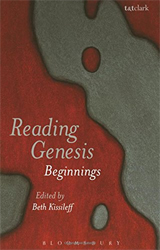Beth Kissileff is the editor of Reading Genesis: Beginnings, a collection of essays on the Hebrew Bible by experts in range of non-rabbinic fields. Beth is blogging here all week as part of the Visiting Scribe series on The ProsenPeople.
“Your ideas come too much from elsewhere,” was one of the comments I received on a paper about Deuteronomy in graduate school, attendant to a disappointing grade.
I was writing about the Bible’s first murder mystery. Deuteronomy 21:1 – 9 talks about a corpse found by itself in a field, no trace to identify the slayer. Forensics in the ancient world not being quite what they are today, the best solution was in a ritual to expiate those in the adjacent towns from any guilt they might bear in the case. After all, if a body is found in your town, you may not have accompanied the person properly or given  sufficient food or water to the traveler. In my mind the ritual was more of a social form, to encourage the group to work together and perhaps promote future safety of those journeying in its environs. I did a great deal of careful research and had proof to back up my claims, yet my teacher remained unconvinced of my interpretation.
sufficient food or water to the traveler. In my mind the ritual was more of a social form, to encourage the group to work together and perhaps promote future safety of those journeying in its environs. I did a great deal of careful research and had proof to back up my claims, yet my teacher remained unconvinced of my interpretation.
After a while, though, I realized my Bible professor was doing me a favor in stating the obvious. Yes, my interest in the text was mainly in how it interacted with ideas swirling around and through it, ideas from elsewhere. So I didn’t do my dissertation on the Bible itself, but on its translations and their effect on Renaissance English literature, to see the sacred text in the vernacular setting of yet another language.
But even though my degree wasn’t in Bible, it was still my text as a Jew, something I continued to read, write, and think about, and to see as a powerful source for creating meaning, a way to integrate into the Jewish conversation of the ages. I couldn’t publish on the subject as an expert in the field, for I am not, but was looking for a way to make this text that I loved so much meaningful to a larger swath of readers than just those who can read scholarly work.
I wondered what would happen if I took people who had expertise from elsewhere, plenty of it, and asked them to use that knowledge and apply it to the text. What if a linguist wrote on the Tower of Babel? Or a lawyer on contracts in Genesis? A political scientist on leadership and group cohesion? A scientist who studies eating behavior on Adam, Eve and the consumption of the fruit? An ethicist on the nature of forgiveness?
I did just this in editing my anthology Reading Genesis: Beginnings. Like myself, none of the writers are Bible scholars, but mixing things up and bringing in ideas from elsewhere gives new modern meaning to the text. I have enjoyed the process of editing the essays and compiling the volume, finding an outlet for my desire to see the text from a different perspective — and giving others a chance to do so, too.
I don’t know whether my professor would approve of a discussion of the text without scholarly apparatus (of a background in ancient Near Eastern, knowledge of philology of antiquated languages, and a complete sense of the textual variants among ancient editions and translations). But, in an odd coincidence, I just interviewed his son, a journalist, whose book I am reviewing.
When I tell the professor’s son about my volume and how in a roundabout way I got the idea from his father, he tells me excitedly how he remembers as a kid overhearing his father on the phone in his study, asking questions of farmers and butchers and craftspeople. My professor was interested in details from outside the text,  wanting to know how farmers did things, what implements they used, to learn from them and get details so that he could get the textual realia right.
wanting to know how farmers did things, what implements they used, to learn from them and get details so that he could get the textual realia right.
So maybe then this sense of elsewhere I’d thought my professor was saying was negative wasn’t at all, but a necessary part of the toolkit of the scholar. I am just deploying the tools in a different way than I would have in graduate school as the editor of my own anthology.
Beth Kissileff is an author and journalist, and frequent reviewer for the Jewish Book Council.
Related Content:
- Gal Beckerman: Barbecuing with the Hijackers
- Galit Seliktar: Behind Farm 54: The Making of a Graphic Novel
- Eric L. Muller: Making It Human
Beth Kissileff is in the process of fundraising and writing grants to develop a program to assist rabbis of all denominations with writing and publishing books. Kissileff is a rabbinic spouse and author of the novel Questioning Return as well as editor of the anthology Reading Genesis: Beginings.




